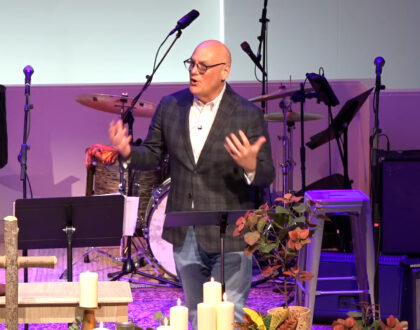Why Relationships Matter

This Sunday, Feb. 5, we will begin a new sermon series on Paul’s short letter to the Colossians called “RELATIONSHIPS MATTER.”
Relationships matter in life, but they are complicated and can be challenging. They are the source of great joy, happiness, and fulfillment as well as great pain, heartache, and disappointment. The quality of our lives will always be tied to the quality of our relationships.
John Gotttman says that the only empirical evidence in his research between couples whose marriage lasts over the years and the ones that don’t boils down to this: does the couple learn to honor and respect the friendship? It’s much more challenging than it sounds. We must work to avoid criticism, defensiveness, contempt, and stonewalling, all of which lead to problems.
In his book Wisdom: Life’s Great Treasure, Richard E. Simmons offers the following insight for being intentional in marriage:
1. Do not be afraid to go for counseling. Counseling is healthy.
2. Set aside time to be alone with your spouse, particularly when you are raising your children. This must be planned. Many couples have arranged consistent date nights. Anniversary trips are important and meaningful.
3. Seek the wisdom of couples who are further down the road in their marriages than you. This can be incredibly helpful.
4. Read good books on marriage. (Sacred Marriage by Gary Thomas, Five Love Languages by Gary Chapman, The Meaning of Marriage by Tim Keller).
In American culture, we often define ourselves by our professions: lawyer, doctor, banker, minister, teacher, therapist. Perhaps we need to put as much of an emphasis on the other roles we play: husband, wife, father, mother, sister, brother, son, daughter. These are the roles that matter most in the big picture.
Marriage is hard but also very rewarding. There are reasons why many marriages don’t make it, and those who suffer through a divorce should not be judged but picked up because they’ve been through a lot. Certain basic foundations upon which healthy relationships and marriages must be based: honesty, trust, selflessness, sacrifice, compromise, patience, and forgiveness.
Falling in love is easy. Staying in love takes work. Gary Thomas says, “I have a theory, behind virtually every case of marital dissatisfaction lies an unwillingness to admit our self-centeredness. Couples do not fall out of love so much as they are unwilling to humbly acknowledge they have shortcomings as a spouse. Sin, wrong attitude, and person failures that are not dealt with slowly erode the relationship.”
It is not surprising that as our culture has become more self-centered, more and more relationships struggle. Building relationships and marriage on the right foundations will help ensure stability and longevity for the future.
In this new series, we will talk about marriage, family, friendship, community, and how we can build healthy relationships in life. I encourage you to read Colossians on your own as we go.
Recommended Posts

“The Word is Near to You” – Jay Hutchens – Oct. 20
October 20, 2024

Jake Patterson – The Bridge – Oct. 13
October 13, 2024

Being “Christian” in an Election Year
October 08, 2024

